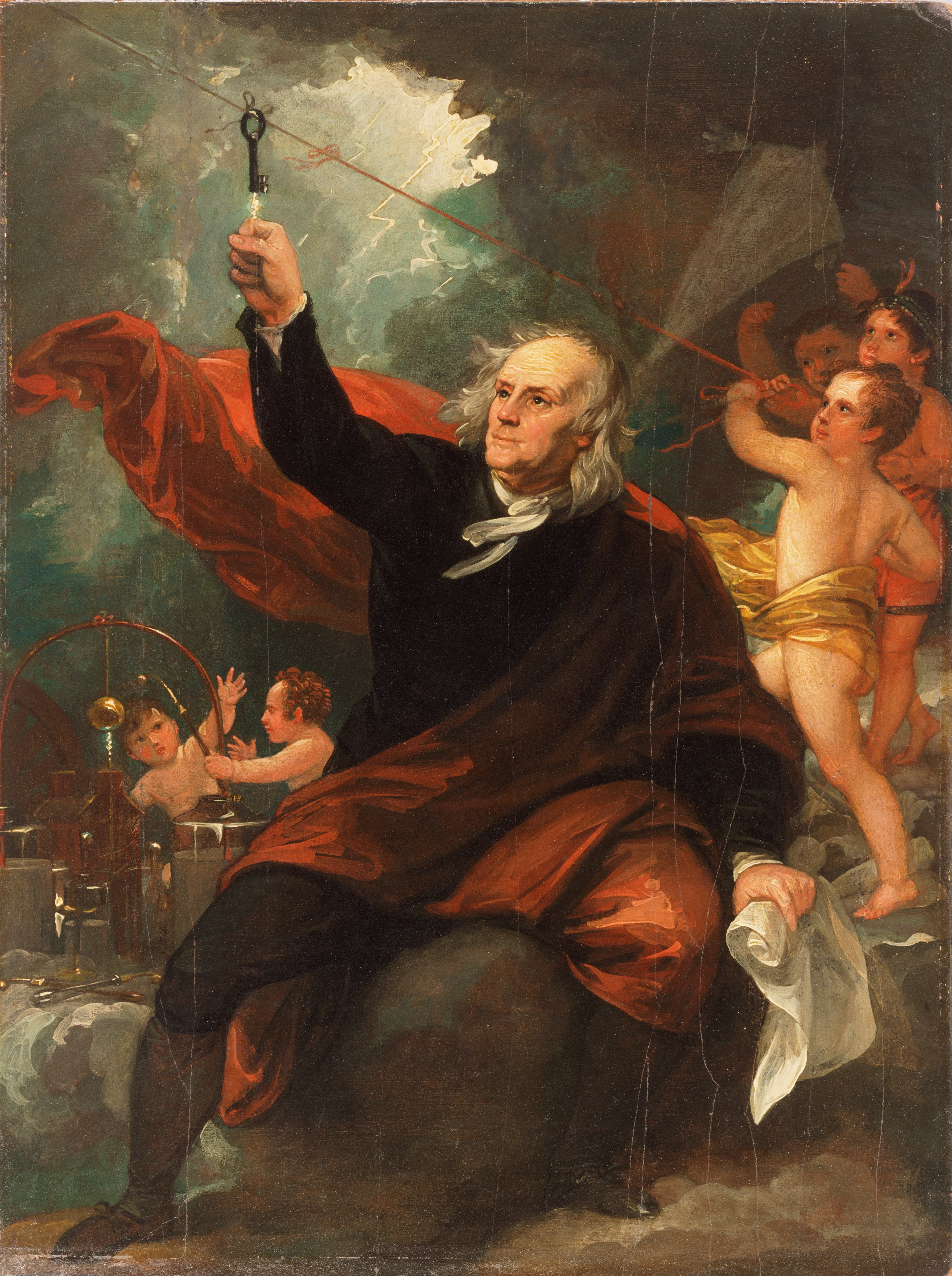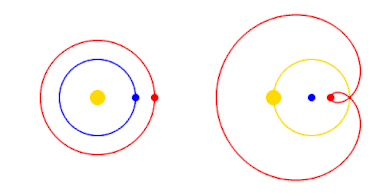The Thing-In-Itself
Enlightenment is man’s emergence from his self-imposed immaturity. Immaturity is the inability to use one’s understanding without guidance from another. This immaturity is self-imposed when its cause lies not in lack of understanding, but in lack of resolve and courage to use it without guidance from another.
~Immanuel Kant
Age of Enlightenment: 1680-1790
The goal of the preceding lessons was to give you a taste of what is sometimes called the "crisis of the Enlightenment." What I'd like to do now is to give you a general overview of the Enlightenment, as well as say a few things about humanism. Then I'll discuss this "crisis" that I'm trying to get you to feel.
Although it is very difficult to summarize in a few paragraphs what the Enlightenment was all about, I can give you a few tidbits (see Robertson 2020). In general, this time period is characterized by a move away from superstition and toward beliefs that can be rationally defended, preferably with physical evidence and air-tight reasoning. So, instead of believing, for example, that lightning was a sign of God's anger—a belief that was fairly widespread and can be found in the writings of, among others, Martin Luther—it came to be understood as a natural phenomenon. Lightning, in other words, came to be seen as just a gian spark of electricity moving between two electrically-charged regions of the atmosphere. In fact, one famous enlightener, Benjamin Frankling, famously demonstrated this with a (dangerous) experiment.

Another development of the time period is a renewed interest in the pursuit of happiness. This was, perhaps surprisingly, initiated by the re-discovery of a poem by Lucretius from the first century BCE. In it, Lucretius defended a view known as Epicureanism, a school of thought that includes belief in hedonism: the belief that happiness is the only intrinsic good. This means that happiness is the only good that is good for its own sake. All other goods, in other words, are good because they bring you happiness. So, as Lucretius’ defense of Epicureanism began to be take hold of European minds, thinkers moved toward the notion that the aim of life is happiness. That is, there was a resurgence of eudaemonism: the pursuit of a philosophy of life with the goal of leading to human flourishing. This led to all kinds of intellectual activity. Ways to reintegrate Christianity and hedonism were sought out. Governments, rather than merely being the means by which to preserve social order, were coming to be seen as the instruments through which widespread happiness was to be achieved.
Also during the Enlightenment, different conceptions about the power of reason were tried out. The rationalists, for example, attempted a geometric approach, where truths are built upon axioms (see Rationalism v. Empiricism). Others, like Niccolò Machiavelli, tried to produce a system for producing effectiveness in statecraft: reason of state. Rationalism eventually gave way, albeit slowly, to empiricism. The empiricists made use of probabilistic reasoning, accepting that we can never experience the true essences of things, only their surfaces, and thus our representations of the world are only approximate. There were also those, such as the philosophes, who advocated a general philosophically-minded way of thinking, one that required regular intellectual dialogue and reading. Finally, Kant, the subject of today's lesson, argued that enlightenment meant to stop being immature and have the courage to reason for ourselves. And courageous reasoning is exactly what he engaged in.
What humanism is

Fountain, by Marcel Duchamp.
The Enlightenment is perhaps also the apex of the influence of humanism. Before humanism, religion and supernatural beings gave meaning and order to the cosmos. Now, humans do. In fact, this is one way to define humanism. In chapter 7 of Homo Deus, Yuval Noah Harari argues that humanism means that humans are the ultimate arbiter on meaning. To make his point, Harari discusses the radical shift of perspective and subject matter in art. It is no secret that religious expression used to dominate all art forms: paintings, music, etc. Now, however, what counts as art is a purely secular matter. In other words, it's ultimately up to humans. Consider the sculpture pictured right. Is it art? Really that’s for humans to debate and decide on. And this notion—that humans can give value to something merely by deciding that it has value—was inconceivable prior to humanism.
A further example can be how we characterize war. Before humanism, war was seen “from above.” The justification for armed conflict was divine, the soldiers were faceless, and the General was a genius. If one army defeated another, the General of the victorious army would claim that it was God's will that they won. (Otherwise, why would they have won?) This is why Genghis Khan called himself "the punishment of God". In this quote by the Great Khan, you can see how supernatural beliefs were imbued even into the reasons for why one group defeats another: "I am the punishment of God. If you had not committed great sins, God would not have sent a punishment like me upon you." Even the losers in war sought answers from the divine. When the Mongols captured Baghdad in 1258, religious leaders found themselves asking why their people had lost favor with Allah. (Why did Allah abandon them?) But now, after humanism, portrayals of war revolve around the individual soldier and their loss of innocence. Think of movies like Full Metal Jacket. We support the troops, not just the general. We critique our politicians if they send our young ones to die for no good reason. The perspective has clearly shifted.
It is, I think, impossible to put yourself into the mindframe of someone prior to humanism. But perhaps you can approximate thinking like someone who was in the transitional period. Perhaps you find meaning in the inquiries of science, as many did during this time period. Also during this time period there was a rise in literacy rates and the proliferation of non-religious literature, like novels (see Hunt 2007). If you find reading this kind of literature liberating, then you are approaching this way of thinking. In other words, you are approaching the worldview of Immanuel Kant.
The Crisis
Kant is best understood in the context of the crisis of the Enlightenment. This crisis was caused by a newfound confidence in reason, beginning with the groundbreaking work of Isaac Newton. Through the scientific method, thinkers were gaining a bewildering amount of knowledge about the natural world. Moreover, this new information conflicted with older views about humans and their planet. It, for example, conflicted with some of the dates given in the Bible. There was also the beginnings of what today we would call biblical criticism. For example, Hermann Samuel Reimarus, albeit a believer, went to town on the Old Testament. For one, he made estimates about how many Jews crossed the Dead Sea during their escape from Egypt (based on numbers given in the Bible) and inferred that it would be impossible for that number of people to cross that distance in one night. Newton himself engaged in biblical criticism. Although he never admitted it during his lifetime, it was eventually discovered that he did not believe in the doctrine of the Holy Trinity. And he argued for this view (in his private writings) using evidence and reason. He compared every available version of I John 5:7, the only biblical testimony to the Trinity, and argued that a past biblical transcriber (specifically St. Jerome) had deliberately corrupted the text to support the doctrine of the trinity (with a comma). All this was leading many to question various traditional authorities, such as the church clergy. These threats to tradition led to questions that we have covered in this courses, including the matter of defining "knowledge", the question of whether or not God exists, the source of morality, and (of course) the problem of free will. Enter Kant.

Human Understanding

The Copernican Revolution
(in perspective).
Prior to Kant's time, various thinkers had been trying to establish the foundations of the natural sciences. These are thinkers like Francis Bacon, René Descartes, John Locke, and Thomas Hobbes. Many found it unsatisfactory to justify science by saying simply that it works. As you might know, if all you know is that something works, but you don't know why it works, then you're going to be in a lot of trouble when it stops working. This is obviously because you'll have no idea how to fix it. And so thinkers were trying to establish the foundations of science for precisely this reason. But before even establishing these foundations, thinkers had to settle on a much more mundane question: Do we perceive the world as it actually is? Each thinker had their own position, but Kant was not satisfied with their theories. In Critique of Pure Reason, originally published in 1781, Kant engages in his Copernican revolution. Just like Copernicus' heliocentric theory takes into consideration that the Earth is simultaneously in its own orbit around the sun when explaining the movement of the other planets, Kant takes up the hypothesis that, when we perceive the objects in the world, our perceptual systems change them. In other words, Kant took into consideration how our cognitive systems give form to our perceptions, a form that isn't actually in the objects in the world.
This idea is profoundly modern. In his (1999) book The Number Sense, Dehaene gives an overview of the countless mathematicians who have wondered why mathematics is so apt for modeling the natural world. By this point, Dehaene has spent some 250 pages arguing that we actually have an innate module programmed into us by evolution that helps us visualize a number line and learn basic arithmetic concepts. And so Dehaene concludes that it is not the case that "mathematics is everywhere." Instead, we can't help but to see mathematics everywhere. Our brains project a mathematical understanding onto the world.
"There is one instrument on which scientists rely so regularly that they sometimes forget its very existence: their own brain. The brain is not a logical, universal, and optimal machine. While evolution has endowed it with a special sensitivity to certain parameters useful to science, such as number, it has also made it particularly restive and inefficient in logic and in long series of calculations. It has biased it, finally, to project onto physical phenomena an anthropocentric framework that causes all of us to see evidence for design where only evolution and randomness are at work. Is the universe really 'written in mathematical language,' as Galileo contended? I am inclined to think instead that this is the only language with which we can try to read it" (Dehaene 1999: 252).
In the Critique, Kant wants to study the limits of abstract thought; in other words, he wants to know what he can know through reason alone. Can we know nothing of value from pure reason? Or can we discover fundamental reality with it, as Plato thought? It would be impossible for me to summarize Kant's most important argument in this work, the transcendental deduction, but I can give you his main conclusion: it is through human understanding that the laws of nature come to be. In other words, human understanding is the true law-giver of nature; it is through our cognitive systems, with their built-in ways of looking at the world, that we "formalize" the world and project onto it the laws of nature, very close to what Dehaene said above.
"Thus we ourselves bring into the appearances that order and regularity that we call nature, and moreover we would not be able to find it there if we, in the nature of our mind, had not originally put it there... The understanding is thus not merely a faculty for making rules through the comparison of the appearances; it is itself the legislation for nature, i.e. without understanding there would not be any nature at all" (Kant as quoted in Roecklein 2019: 108).

Kant's Metaphysics


To be continued...
FYI
Suggested Reading: Internet Encyclopedia of Philosophy, Immanuel Kant: Metaphysics
TL;DR: Philosophy Tube, Beginner's Guide to Kant's Metaphysics & Epistemology
Supplementary Material—
Advanced Material—
-
Reading: Michael Rohlf, Stanford Encyclopedia of Philosophy Entry to Immanuel Kant
-
Book: Immanuel Kant, Critique of Pure Reason

